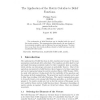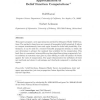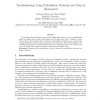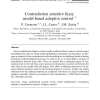122
click to vote
IJAR
2002
15 years 1 months ago
2002
In this paper, we study the notion of marginal independence between two sets of variables when uncertainty is expressed by belief functions as understood in the context of the tra...
87
Voted
IJAR
2002
15 years 1 months ago
2002
123
click to vote
IJAR
2002
15 years 1 months ago
2002
The mathematics of belief functions can be handled with the use of the matrix notation. This representation helps greatly the user thanks to its notational simplicity and its effi...
IJAR
2002
15 years 1 months ago
2002
IJAR
2002
15 years 1 months ago
2002
120
click to vote
IJAR
2002
15 years 1 months ago
2002
The usual methods of applying Bayesian networks to the modeling of temporal processes, such as Dean and Kanazawa's dynamic Bayesian networks (DBNs), consist in discretizing t...
IJAR
2002
15 years 1 months ago
2002
123
click to vote
IJAR
2002
15 years 1 months ago
2002
We develop a decision-theoretic method that yields approximate, low cost troubleshooting plans by making more relevant observations and devoting more time to generate a plan. The ...
110
click to vote
IJAR
2002
15 years 1 months ago
2002
Fuzzy model-based adaptive control, unlike traditional fuzzy control, extracts expert knowledge from data by using model identification techniques. In this paper, we propose an an...




